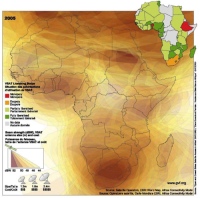You may remember that I described an Internet Bandwidth Bonanza in Africa on the way two years ago, and you might have heard of one or another of the fiber optic cables down both the east and west coasts of Africa since then. Now we are in a new phase, in which the industry is in a tizzy over whether there is too much bandwidth on offer. The question is raised in this news item that I just now saw on the Black Data Processing Association Africa mailing list (an excellent resource for ICT in Africa).
West Africa Cable has telecom sector worried
IT News Africa
Monday, April 25th, 2011
I can tell you that there isn't anywhere near enough bandwidth yet for the demand that is emerging, but I agree with the analysis below that the market (which isn't by any means Free) is going to have trouble reaching a proper balance between bandwidth supply and demand. There is every possibility of a fiber bubble, in which too many companies lay cable until prices crash, and then nobody lays cable even when it becomes necessary again, oops, lather, rinse, repeat.
You might think that nobody had ever heard of countercyclical investment. Oh, you haven't? I'll give you the short version. It's what Warren Buffett does. Buy when everybody's selling, and sell when everybody's buying. We must write something about that for schoolchildren. It's actually important to know.
The problem, you see, is price wars. Or, from the user point of view, the good news is price wars. They have occurred in various African countries, and more price wars will come to the rest of Sub-Saharan Africa as fiber reaches each country, as fiber-connected networks expand in each country, and as onerous regulations are lifted, such as outlawing Voice over IP in some countries. In this case, the WACS cable that landed in South Africa this month is expected to be in full use sometime in 2012, which is when it might trigger more price wars. I'm looking forward to them.
Conventional economics, which assumes rational behavior by everybody and no such onerous restrictions, talks about markets reaching equilibrium between supply and demand at every moment. Conventional economics, however, has nothing to do with those portions of reality in which irrational exuberance rules. The more hidebound of the Market Fundamentalist economists explicitly deny the existence of such portions of reality that don't fit their equations.
As the African continent just begins to work its way out of massive price wars that have adversely affected operations in a number of countries, the landing of the West Africa Cable System (WACS) has analysts and industry experts worried that it could spark a new round of intense battles.According to analysts, WACS undersea cable is also expected to bolster the continent's capacity to deliver on services and infrastructure.
http://mybroadband.co.za/news/files.php?file=wacs_548158332.jpg
[Note to editors: The software here won't let me embed this image of the WACS path from the UK to SA.]In Nigeria, companies are gearing up for the cable and worries are developing that many of the country's telecom operators are planning a new round of price wars and telecom wars.
"It is likely to spur something and while we are waiting to see what the cable will truly bring to Africa, here in Nigeria people are concerned that companies are going to do something drastic, even if we don't quite know yet," said Steven Umbali, a government official working on logistics.
"Lack of bandwidth on the continent has arrested the development of Africa and has constrained Africa from achieving its full potential," said Karel Pienaar, MTN South Africa managing director, in comments published by Computer World.
By Staff
Yes. What he said.
- In banking, where credit cards issued by African banks not connected to the digital financial network cannot be used in e-commerce, for example by college students who want to buy books on Amazon.
- In government, where the level of service and transparency now expected in developed countries remains almost unthinkable in Africa.
- In healthcare, where there are no nationwide digital medical records systems, and not even adequate public health surveys.
- In civil society, where activists cannot meet online as they do all over North Africa and the Middle East to discuss oppression, corruption, and mismanagement in government, and to plan actions against them.
- And of course in education, where so many villages have neither electricity nor Internet for OLPC deployments.
So far. Watch this space.
Here are a few more items to give you a bit of the picture.
Nigeria looks to new licences to lower telecom costs
By Michael Malakata , Computerworld Zambia
12 Apr, 2011
Price wars in East Africa for mobile phones haven't reached Nigeria.
Africa ICT & Telecom Network
Zantel Tanzania wants regulator to stop price war
Posted by Caroline Wiezien on March 1, 2011 at 2:01pm
For the benefit of consumers, you know. We must protect them from unscrupulous operators who would lower prices now and then raise them later, as opposed to those unscrupulous operators who would simply keep rates high all the time.
Africa mobile connections overtake W Europe but price wars hit ARPU
Updated:2011/4/1 11:34
Total number of mobile phones in Africa now more than in Europe, but per capita still well below.



The African image link reports me that the site is attacker in Firefox.
Jose, thanks a lot for the heads-up. I've contacted the folks at whiteafrica.com to let them know about this issue.